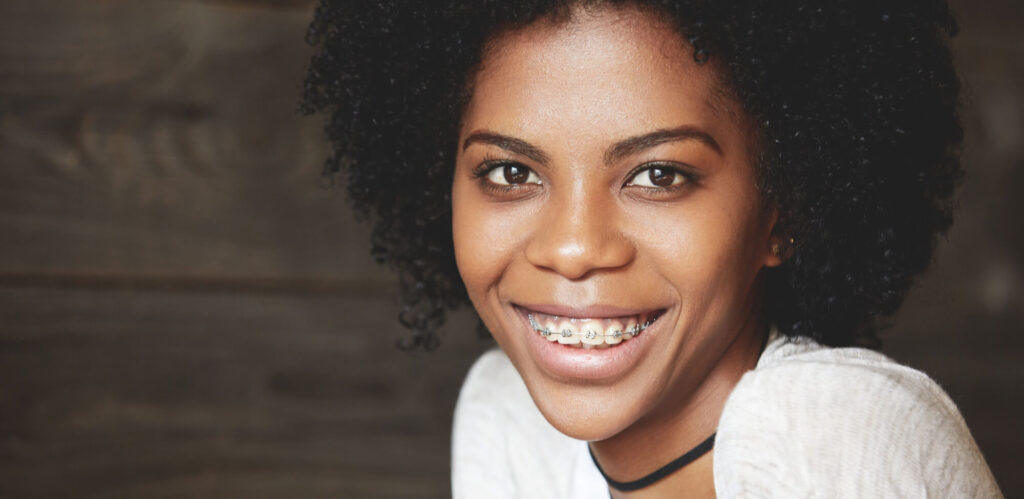Your Guide To Braces
We’re here to help you transition into your new life with braces! You can find answers to common questions about braces here and refer back to them at any point during your treatment.
If you have any unanswered questions, please don’t hesitate to reach out to us. Our team is here to provide you with the information you need to achieve a beautiful smile with a comfortable treatment process.
How Long Will My Treatment Period Be?
The length of your braces treatment will depend on a few factors, including the severity of your case, your age (treatment is generally shorter for younger patients whose bones are still developing, your overall health, and your diligence in wearing your appliances (like rubber bands) or your clear aligners if you choose Invisalign.
The average treatment length for traditional braces, gold braces, and ceramic braces can be anywhere from 12 months to 36 months.
At your first visit, one of our experienced orthodontists will examine your condition to give you an estimated treatment length.
Are There Different Types Of Braces For Me To Choose From?
Yes, at Cooper Orthodontics, you have options! We know that each of our patients is unique with different treatment preferences, so we offer different types of braces, including traditional braces, clear ceramic braces, and gold braces. We also offer Invisalign clear aligners for teens and adults.
Whether you prefer a flashy treatment or a more discreet treatment, we have an option to suit your style.

How Do I Brush And Floss My Teeth While Wearing Braces?
When you get your braces on, we’ll show you how to properly brush and floss your teeth!
In the meantime, here’s how to properly brush your teeth with braces:
- Brush the outside and inside of your teeth, as well as the chewing surface and gumline.
- Brush in small circles, at a downward angle on your upper teeth and an upward angle on your lower teeth, to reach between your archwires and around the corners of your brackets.
- Make sure you’re brushing thoroughly, but gently enough to avoid damaging your braces.
When flossing between your teeth, we recommend using a specialized flossing threader that allows you to insert the floss thread in the space between your teeth and wires. Specialized flossing threaders have a solid end that makes it easier to push the floss through the archwires.
Can I Transfer To Cooper Orthodontics If I’m In Active Treatment?
Yes, you can! We’ll help you do it. Check out this blog for some information on how to ensure a smooth transition from your previous orthodontist to one of our conveniently located offices in South Florida.
The sooner you begin the transition, the smoother the process will be. Be sure to alert your current orthodontist as soon as you know that you’re moving, and please reach out to us so we can resume your treatment with minimal disruption.

Do Braces Hurt?
We think you’ll be relieved to know that braces don’t hurt! When we place your braces on, we are simply bonding brackets to your teeth, and attaching your archwires to your brackets. This won’t cause you any pain.
The first week you have braces, you may experience some minor soreness as your teeth and gums aren’t used to the support of your braces yet. You can take some Tylenol or another over-the-counter pain reliever to counteract the soreness.
What Can I Eat With Braces?
You can still eat plenty of delicious foods with braces! During the first week of your treatment, as your teeth may be a bit sore, you may want to choose softer foods, like pasta, tuna, mashed potatoes, or soup. Knowing what to eat your first week with braces takes some of your own discretion. You can integrate harder foods into your diet as soon as you’re feeling up to it.
Here’s a list of foods you can eat with braces:
- Dairy — cream cheese, pudding, milk
- Bread — tortillas, pancakes, muffins
- Grains — pasta, rice, cereal
- Meats — soft chicken, soft meatballs, lunch meats
- Vegetables — cooked carrots, peas, beans
- Fruits — bananas, kiwis, strawberries, grapes
- Treats — ice cream (no nuts), milkshakes, Jell-O, frozen yogurt
What Foods Should I Avoid With Braces?
Try your best to avoid foods that are chewy, sticky, crunchy, or hard. These foods are infamous for damaging brackets and wires and breaking orthodontic appliances.
Chewy, sticky foods can stick to your wires and pull them out of place; hard foods can pop your wires out of place or break a bracket. Next thing you know, you’re visiting us for an emergency orthodontist appointment!
Here are some examples of foods to avoid when wearing braces:
- Chewy foods — bagels, hard bread rolls, Twizzlers
- Crunchy foods — popcorn, ice, dried fruits, Cheetos, Doritos
- Sticky foods — caramel, gum, Laffy Taffy, Starburst
- Hard foods — nuts, Jolly Ranchers, hard pizza crusts, Nerds
- Foods that require biting — corn on the cob, apples, carrots
Are My Teeth Supposed To Wiggle During Orthodontic Treatment?
Don’t worry, this is normal! Your teeth and gums are adjusting to your braces. The whole point of your treatment is to shift your teeth into alignment, and with this shifting comes some minor tooth wiggling.
Toward the end of your treatment, once your teeth have shifted into the desired position and you enter the retention phase, your teeth will stabilize and stop wiggling.
When Should My Child Receive His Or Her First Orthodontic Exam?
As recommended by the AAO (American Association of Orthodontists), children should receive their first orthodontic exam around the age of 7. At this age, our experienced orthodontists are able to detect any problematic conditions currently present or soon-to-be present.
The earlier we’re able to intervene with a problematic condition, the more efficient orthodontic treatment will be.
Do I Still Visit My Dentist During My Orthodontic Treatment?
Yes, visiting your dentist is as important as ever. Your orthodontist and dentist are working together to create your beautiful, healthy smile. It’s important that you still receive professional dental cleanings every 6 months, or as often as your dentist recommends.
Maintaining good oral health throughout your braces treatment is essential for achieving the best results from your orthodontic treatment, and your dentist plays a key role in that.